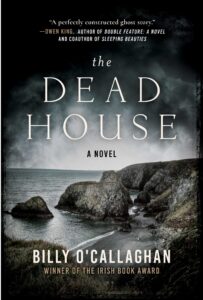Paul O’Connor may have grown up in Connecticut, gone to college in Indiana and spent many productive decades in North Carolina, but there’s a lot of Ireland in him. He’s discovered a book by an Irish author that’s not exactly new – published in 2017 – and not usually what would be Paul’s cup of whiskey. But he’s entranced, and he tells us why.
Reviewed by Paul T. O’Connor
THE DEAD HOUSE. By Billy O’Callaghan. Arcade. 216 pages. $16.99.
 The southwestern-most corner of Ireland is the eeriest place I’ve ever been.
The southwestern-most corner of Ireland is the eeriest place I’ve ever been.
When I first visited the area in 1973, the craggy topography and unusual vegetation, intensified by the howling winds, driving rains and threatening black clouds raging off the Atlantic, explained to me how the Irish can believe in the supernatural. As I drove down a deserted single-lane road lined with vegetation pressing both sides of my car, I expected the Banshee, a leprechaun or some other mystical fairy to attack.
Billy O’Callaghan sets his ghost story, The Dead House, in West Cork, just across a narrow bay from the Iveragh Peninsula from which my ancestors emigrated in the late 18th century. In this 2017 Irish Book Award winner, he writes that the landscape has a “rare light and aura of ancient magic.”
Michael Simmons, retired for health reasons from a career as an artists’ agent, narrates the story of Maggie Turner, an artist he represents. He discovered her while she was a student and helped her become successful in British art circles. A true friendship developed and, after her boyfriend seriously beat her, Michael provided a safe place to recover.
Already psychologically fragile, Maggie senses she must get away. She leaves England, eventually finding an abandoned cottage in the most isolated corner of West Cork, an area of landscapes and light perfect for her style of painting. But it is also a place that Michael and other friends fear will be too isolated for Maggie. They fear that the solation will unsettle her more than even city life. At least in London or Dublin she would have the support of friends.
Six weeks later, the cottage renovated to livable standards, Maggie hosts Michael and two female friends – one, Alison, is Michael’s future wife – for a weekend housewarming. Amid the hiking, eating and whiskey drinking, a Ouija Board is produced and a supernatural string of events unfolds.
It’s been said that the Irish speak English as beautifully as the French speak their language. And in O’Callaghan’s writing, those lovely Irish conversations make beautiful dialogue. His descriptions left me reaching for the yellow under-liner numerous times, uselessly, of course, because these were library books.
I did think, however, to bookmark his fine description of the mood after the Ouija Board experience:
There was something blocked about that whiskey-fueled aftermath. What had occurred lay around us like the taint of pepper in the air, a slow poison that once tasted cannot be easily forgotten.
I don’t read ghost stories. Have never read a Stephen King novel. Almost didn’t read this one, except that I’d just discovered O’Callaghan; only The Dead House and his spectacular The Boatman and Other Stories were in the local library. Some authors are worth reading just for their sentences, even if their story is not your type. O’Callaghan is that kind of author.
As a ghost story, others will have to judge The Dead House. I see it more as an insight into that dark, eerie side of Ireland that often gets overshadowed by the merrymaking and Guinness. The book’s cover notes say it is a “dread-inducing psychological thriller.” I’ll just comment that the story creeped me out, which is what ghost stories are supposed to do, right?
Telling his story a decade after the climactic events, narrator Michael and his wife were still dealing with it, and at two points in the novel, Michael paraphrases William Faulkner’s famous line that “the past is never dead; it’s not even past,” applying it to Irish history rather than American.
Maggie was unable to escape the past and, as the novel ends, Michael and Alison are finding that they can’t either.